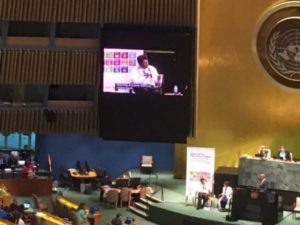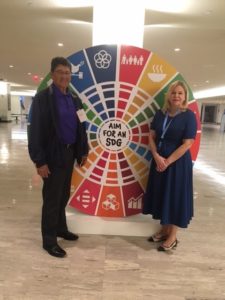
10 July 2023
In the forum moderated by HLPF Chair Lachezara Stoeva, President, UN Economic and Social Council (ECOSOC), Ovide Mercredi and other participants discussed the effective and inclusive recovery measures to address the impacts of the COVID-19 pandemic on the Sustainable Development Goals (SDGs) and explore actionable policy guidance for the full implementation of the 2030 Agenda and the SDGs at all levels. Speaking as an older Cree man, who has spent his adult life fighting for the rights of First Nations people, Ovide challenged Member States to commit to real change by addressing the SDG goals in a comprehensive manner.
Ovide’s presentation, titled “Overcoming the crisis, driving transformation for the SDGs, and leaving no one behind”, was enthusiastically received by the panellists and audience and generated lively Q and A. The highlights of his discussion included:
- Older Persons suffered and died disproportionately during the COVID-19 pandemic. We all witnessed it, in every country, rich and poor, north and south, there was horrific death and suffering, and none felt it so severely as old people.
- We saw skyrocketing rates of elder abuse, lack of access to social services and older people negatively stereotyped and portrayed as a homogeneous group.
- Older people were denied access to health care, left to die unaided in long-term care homes in rich countries including Canada where we were, disgracefully the OECD country with the highest death rate in long term care during the first two phases of the pandemic.
- In the last 3 year we have seen the evil impact of ageism and I use the word evil in its’ truest sense – because what we just witnessed was truly immoral, reprehensible, harmful, and deadly. It calls on all of us to ensure older persons are truly included in the SDG’s and that their human rights are thoroughly protected.
- Older Persons have a right to participate in national as well as regional and local level planning and we respectfully submit that a more concerted effort to engage older persons in national-level work on the SDG’s is required by the Government of Canada.
- Older Persons do not have a legally binding instrument (a United Nations Convention on the rights of older persons), like other groups who have faced inequities enjoy (i.e., women, children, persons with disabilities). In other words Older Persons rights are not adequately protected under international law.

Ovide with Margaret Gillis, President of ILC Canada
For further details of Ovide’s remarks, please visit UN TV (www.untv.org, July 12, 2023) and click the link here.
The International Longevity Centre Global Alliance is delighted to be approved as an Affiliate of the World Health Organization Global Network of Age Friendly Cities and Communities.
20th June 2025
The ILC Europe Network, launched in December 2021, addresses longevity and population ageing in Europe. The Network works to organise policy and research events, share good practice, and engage with policymakers across the continent.
20th June 2025
Young and old united in imagination
Generation Mixer is a creative project connecting primary school children and local older adults through the power of imagination. By inventing and exploring imaginary worlds together, generations build meaningful bonds and discover new talents.
19th June 2025


